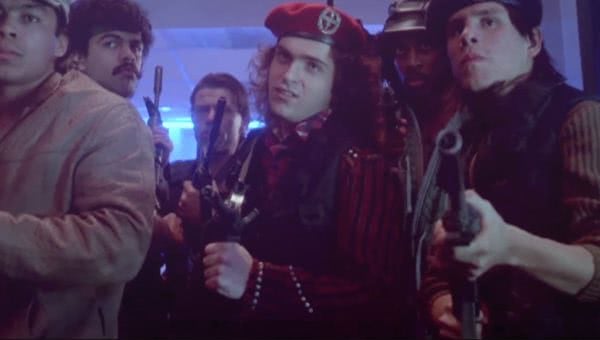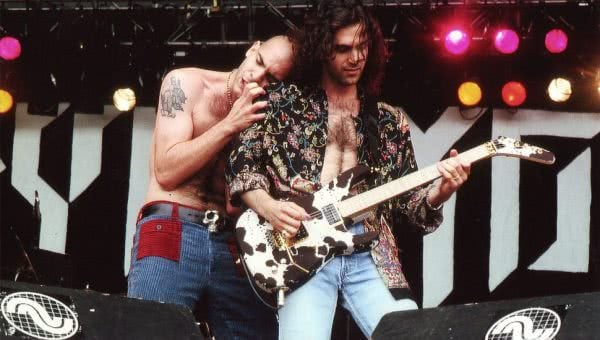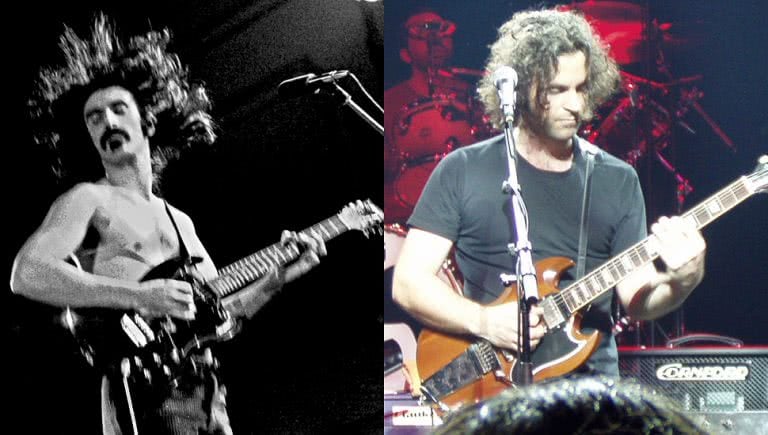In a career that spanned over three decades, Frank Zappa cemented himself as one of the greatest musicians of the 20th century, successfully tackling an insanely diverse range of genres that went from pop to musique concrète, and influencing everyone from The Beatles to Spinal Tap.
His son Dweezil has carried on with that legacy with the project Zappa Plays Zappa, a band that pays homage Frank’s oeuvre, replicating with affection every solo and every weird chord variation with almost uncanny precision.
We decided to revisit some weird and amusing anecdotes from their careers.
Dweezil was named after an odd toe:
Ever wondered where the guitar virtuoso got his unusual name? Frank Zappa affectionately called “Dweezil” a weirdly curled pinky toe of his mom Gail. Funnily enough, the hospital where Dweezil was born declined to register him under the moniker, so Frank ended up registering him as Ian Donald Calvin Euclid Zappa, a mishmash of the names of several musician friends.
Dweezil learned about this when he was five years old, and demanded that his nickname had to become his legal name. The Zappa’s had to hire an attorney and make Dweezil official.
Dweezil Zappa recorded his first single when he was twelve:
Having grown surrounded by his dad’s music and friends, Dweezil had the fortune of being tutored by absolute guitar legends like Steve Vai. In 1982, when he was just 12 years old, Zappa Jr. had his first experience on stage performing the song ‘Stevie’s Spanking’ with his father’s band at the Hammersmith Odeon in London.
”That was a great experience. I was so excited to have been asked to play but I was incredibly nervous.” Dweezil reminisced in an interview with Produce Like a Pro, “Since I could only really play the lead in the key of A, Frank devised a hand signal for the band to modulate the song ‘Stevie’s Spanking’ down to A from its original key of B”
Love Music?
Get your daily dose of metal, rock, indie, pop, and everything else in between.
That same year the pre-teen had the chance to record his very first single, ‘My Mother Is A Space Cadet’, released on Frank Zappa’s Barking Pumpkin label and produced by none other than Eddie Van Halen. In the following years the guitar wunderkind played in Frank Zappa’s track ‘Sharleena’ and provided vocals on the album Frank Zappa Meets The Mothers Of Prevention.
Check out Dweezil Zappa’s ‘My Mother Is A Space Cadet’:
https://youtu.be/NCm2M2BizYM
Frank Zappa was a “practical conservative”:
Although he was a registered Democrat for the majority of his life and heavily criticised the Reagan administration and the Christian Right, in the ‘Real Frank Zappa Book’ from 1989 he identified himself quite differently; “Politically, I consider myself to be a (don’t laugh) ‘Practical Conservative’” he confided to music journalist Peter Occhiogrosso. “I want a smaller, less intrusive government, and lower taxes.”
Dweezil once had a cooking show:
During the late ‘90s and early aughts, Dweezil Zappa tried his hand at acting. He voiced the character Ajax Duckman from the animated series Duckman, appeared with his sister Moon Unit in the sitcom Normal Life, and he composed and performed the main theme of The Ben Stiller Show.
He also co-hosted in 2004 the Dweezil & Lisa cooking show on the Food Network with fellow musician Lisa Loeb who he dated at the time.
Check out ‘Black Napkins’ by Dweezil Zappa:

There’s a bunch of Zappa statues all over the world:
Lithuanian sculptor Konstantinas Bogdanas who previously made portraits of Vladimir Lenin and sculptures of local historical figures like mathematician Jonas Kubilius and composer Juozas Gruodis, immortalised Zappa in 1995 with a bust installed in the centre of Vilnius, capital of Lithuania. In 2008 he cast a second Zappa statue, this one installed in Eastern Ave, Baltimore.
In 2002 another bust of Frank Zappa was installed in the small German town of Bad Doberan. People here must dig his music a lot because since 1990 they’ve held an annual festival that celebrates his life and music called the “Zappanale”.

Frank Zappa was labelled as an anti-Semite
“I want a nasty little Jewish Princess / With long phony nails and a hairdo that rinses / A horny little Jewish Princess / With a garlic aroma that could level Tacoma Lonely inside / Well, she can swallow my pride.”
The lyrics for his 1979 song ‘Jewish Princess’ incited a response from the Anti-Defamation League (ADL), who considered it anti-Semitic and pushed to block the tune from getting radio airplay.
“The ADL is a noise-making organisation that tries to apply pressure on people in order to manufacture a stereotype image of Jews that suits their idea of a good time,” he told Relix Magazine.
“What they’re really about is manufacturing a freeze-dried, totally perfect image of a Jew… their job is to make sure that everybody who is not a Jew will always perceive Jews in just this one special, perfect way.”
Check out Frank Zappa’s ‘Jewish Princess’:

Don’t touch that dial!:
In 1987 Dweezil played Stevie, a member of the underground guerrilla in the Arnold Schwarzenegger sci-fi romp The Running Man. Curiously, he was not the only rocker in there, Mick Fleetwood of Fleetwood Mac played the leader of the resistance.

That time Frank Zappa played a drug lord in Miami Vice:
Zappa had multiple TV cameos throughout his career. He famously demonstrated how to make music with a bicycle in The Steve Allen Show in 1963, wreaked havoc in Saturday Night Live in 1976, appeared in a few episodes of Shelley Duvall’s Faerie Tale Theatre in the ‘80s, and lent his voice to The Ren & Stimpy Show in the early ‘90s.
But of all his acting gigs, probably the weirdest was playing the malevolent drug dealer Mario Fuente in the 1986 Miami Vice episode ‘Payback’. His acting is so offbeat, one does not know if Zappa was just trolling the audience or doing his very best.
Check out Frank Zappa in Miami Vice:

The Zappa family quarrelled in public over five years:
Dweezil Zappa recorded three albums during the ‘90s with his brother Ahmet Zappa under the name AZ/DZ, a project that ended following Frank Zappa’s death in 1993. He spent much of the following decade trying his luck at acting and composing TV soundtracks, he managed to release a couple of solo albums and collaborated with other artists like “Weird Al” Yankovic.
But his most successful endeavour came in 2006 when after several years of preparation he unleashed Zappa Plays Zappa, the tribute act devoted to performing Zappa Sr.’s extensive music catalogue with the aid of many of his original musical collaborators, including luminaries like Napoleon Murphy Brock, Terry Bozzio, and Steve Vai.
The project was a critical and commercial success, reviving the Zappa brand among hardcore fans and introducing Frank’s music to a whole new audience. In 2009 the band won a Grammy Award for Best Rock Instrumental Performance.
Things started to get sour after Dweezil’s mum Gail died of lung cancer in 2015. Married to Frank since 1966, in 2002 she funded the Zappa Family Trust to oversee and administer the treasure trove of Frank Zappa’s musical and artistic work as well as his commercial image.
Just before her death, Gail entrusted the family company to her two youngest children, Ahmet and Diva, giving each of them a 30% stake while leaving Dweezil and Moon each with only 20%.
Shortly after Gail’s death, the trust had informed Dweezil that since the name “Zappa Plays Zappa” was trademarked along with Frank Zappa’s image, he’d have to surrender to the trust all earnings from merchandise. A flurry of biting open letters and blog posts between the Zappa siblings would follow, exposing the family quarrel to the public.

“Now the trust owns that name and they’re saying, ‘Well, we own that name, you can’t play under that name unless you let us keep all the merch money, and you’ll only have to pay a dollar’ [to license the music]” Dweezil Zappa told The Orange County Register in 2016, “They’re not recognising the fact that I’ve already been doing this for 10 years,” he bemoaned, “I offered to sell Zappa Plays Zappa merch on tour and split it 50-50 and they said, ‘Nope, we want it all.’”
Risking copyright infringement damages of $150,000 per song, Dweezil decided to change the name of his act to Dweezil Zappa Plays Frank Zappa and cheekily called his tour “50 Years of Frank: Dweezil Zappa Plays Whatever the F@%k he Wants – The Cease and Desist Tour.”
“My last name is Zappa; my father was Frank Zappa,” Dweezil comments in an interview with The Houston Chronicle, “But I am not allowed to use the name on its own. I’m not allowed to use a picture of him. I’m not allowed to use my own connection with him without some sort of deal to be struck.”
The very public feud ended in 2018 after a conciliatory reunion between the Zappa siblings. “Once we sat down and actually listened to one another, we found a much greater understanding of each other’s intentions.” read the official statement, now deleted from Dweezil’s site.
“We regret that our communication broke down and that things were misconstrued. It may be a bumpy road at times – we are a passionate Italian family – but we have decided to work toward privately discussing issues rather than using public forums and lawyers.”
Since then Dweezil has been performing under his name, and the trust has set their own live project, “The Bizarre World of Frank Zappa”, a concert that features former Zappa band members playing alongside a holographic projection of Frank Zappa.
Deep Purple’s ‘Smoke in the Water’ is inspired on a Zappa concert incident:
“We all came out to Montreux / On the Lake Geneva shoreline / To make records with a mobile / We didn’t have much time.
“Frank Zappa and the Mothers / Were at the best place around / But some stupid with a flare gun / Burned the place to the ground
“Smoke on the water, fire in the sky / Smoke on the water.”
The lyrics pretty much sum it up. In early December of 1971, Deep Purple were in Montreux, Switzerland, to record a new album using a mobile recording studio owned by The Rolling Stones that was installed at the entertainment complex part of the famous Montreux Casino.
At the same time, Frank Zappa and The Mothers of Invention were playing a gig held in the casino’s theatre. Legend says, when Don Preston was blasting away his synthesiser solo on the trippy, experimental tune ‘King Kong’, some “stupid with a flare gun” among the audience shot a flare gun toward the rattan covered ceiling, turning the venue into a blazing furnace.
Fortunately, there were no casualties, and everybody managed to flee the scene with no major injuries, but the resulting fire consumed the entire casino complex, along with all the equipment from Zappa’s entourage.
The perplexed members of Deep Purple watched from their hotel how the smoke from the burning casino spread over Lake Geneva, inspiring their hit song.
Check out ‘Smoke On The Water’ by Deep Purple:

That December was a dark month for Zappa, as six days later he would suffer another tragedy, this time one that almost cost his life.
Just six days later, on the 10th, a vexed fan pushed Frank Zappa from the stage at London’s Rainbow Theatre, inflicting several serious injuries. Legend says the band was at the end of their set, and as the encore Zappa decided to play a bizarre, sarcastic cover of The Beatles’ ‘I Want to Hold Your Hand’. Trevor Charles Howell, a 24-year-old worker rushed like a possessed man to the stage and pushed Zappa into the venue’s concrete orchestra pit.
“The band thought I was dead,” he said in The Real Frank Zappa Book, “My head was over on my shoulder, and my neck was bent like it was broken. I had a gash in my chin, a hole in the back of my head, a broken rib, and a fractured leg. One arm was paralyzed.”
It was later known that Howell’s attack was motivated by petty jealousy because his girlfriend was infatuated with Zappa. The incident left the musician wheelchair-bound for a year, cursed him with chronic back pain for the rest of his life, and allegedly caused his voice to drop a third due to his crushed larynx.

































